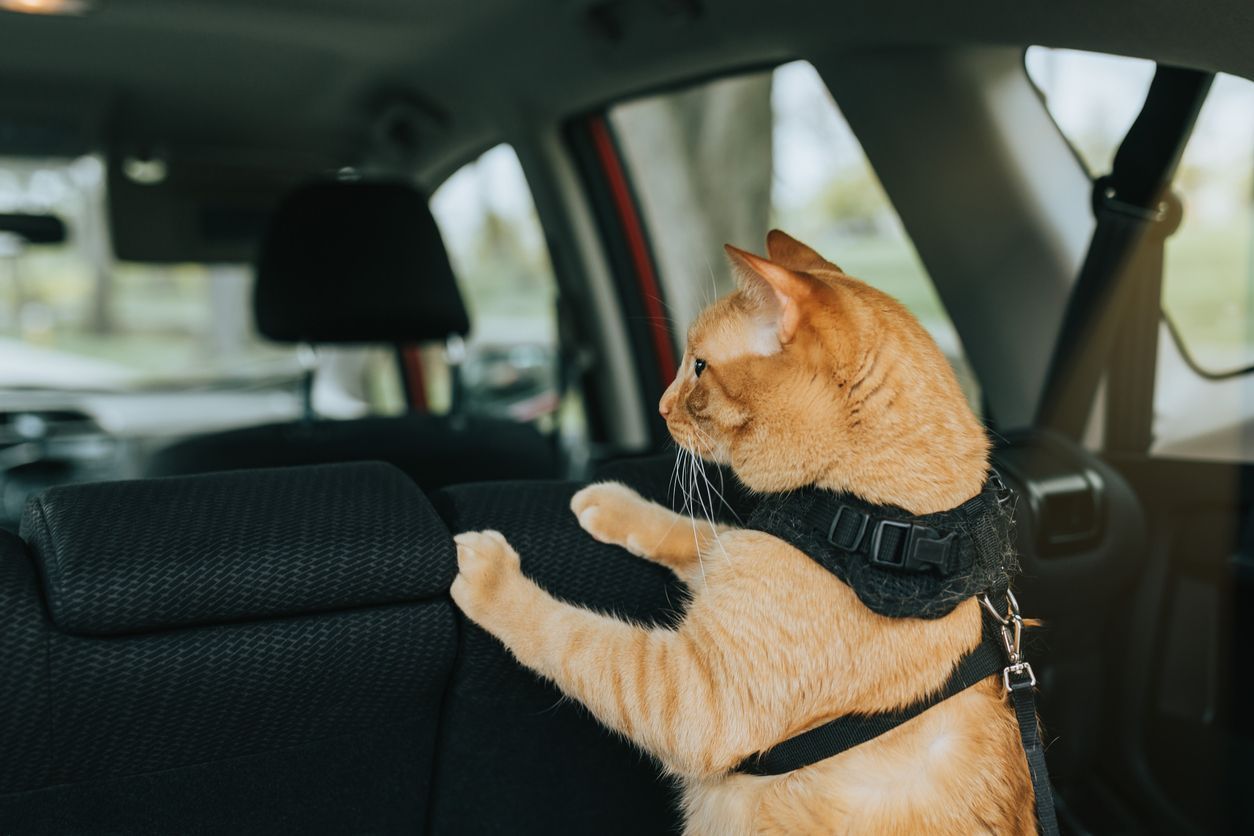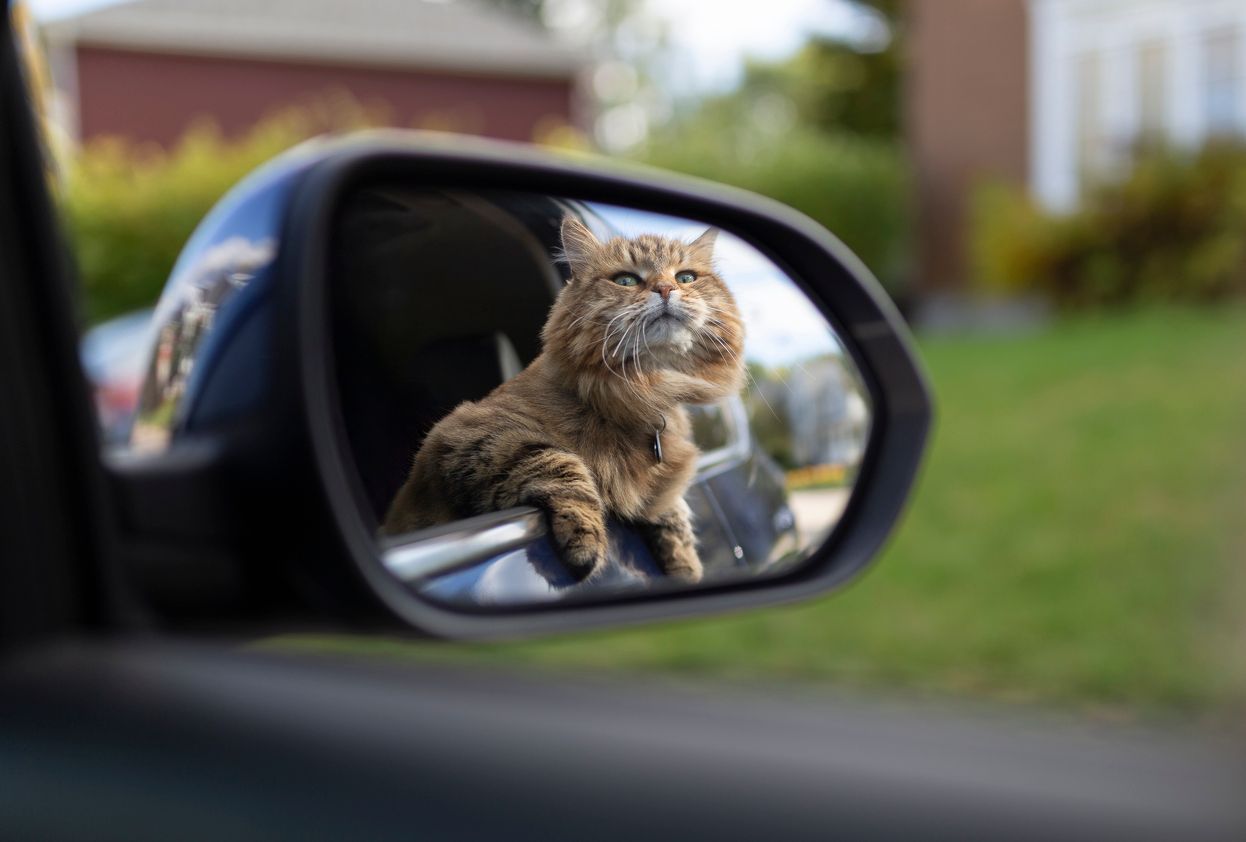Can cats get carsick?

Key takeaways
- Motion sickness in cats is caused by unpredictable movements and sensory confusion, leading to nausea and vomiting.
- Travel anxiety can appear like car sickness but is treated differently. In addition, many other health issues can lead to gastrointestinal upset. Talk to a veterinarian to determine why your cat is getting sick in the car and how best to treat it.
- There are a variety of treatment and prevention methods for carsick cats, including medication, desensitization training, and adjusting the carrier or car’s environment.

Motion sickness is a condition where cats show signs of anxiety and nausea as a result of being in motion, often in the car. The effects of motion sickness can be unpleasant for both pet parents and their cats. Unfortunately, motion sickness in cats is incredibly common. On the bright side, there are several steps you can take to prevent and treat it. In order to prevent and treat motion sickness in cats, it is important for owners to know:
- What motion sickness is
- What causes a cat to get sick during car rides
- The difference between motion sickness and travel anxiety
- Signs of car sickness in cats
- How to treat and prevent car sickness in cats
Treatment for motion sickness in cats varies between individuals, but may include anxiety or anti-nausea medications. It’s best to speak to a veterinarian before giving your cat over-the-counter medications to make sure their symptoms are caused by motion sickness instead of another underlying health issue, and ensure you are giving them the proper medication and dosage. A virtual veterinary visit is a convenient way to talk to a veterinary professional about your cat’s car sickness symptoms, even while traveling.
Why do cats get car sick?
Motion sickness in cars, planes, boats, and other modes of transportation is caused by unpredictable movements that affect the inner ear. The inner ear helps regulate balance by telling the brain how the body is oriented in space. As the body and head move, fluid inside the ear moves in parallel. This movement sends a signal to the brain, which sends compensation signals to the rest of the body, preventing falling or dizziness. When the head moves unpredictably, as when traveling by car, the fluid in the inner ear moves around rapidly, sending confusing signals to the brain that can result in feelings of nausea and vomiting.
What is motion sickness in cats?

Motion sickness in cats is a feeling of nausea and a resulting upset stomach during travel. It can occur in cats in cars, on planes, or any other form of transportation. Because cats most often travel with their owners in cars, cat owners most often associate the condition with car sickness.
Motion sickness vs. anxiety in cats
Motion sickness and situational anxiety in cats have similar symptoms, so it is difficult to tell them apart. “Many cats become uneasy outside the comfort of their normal environment and can become stressed in the car,” explains Dr. Jo Myers, a Vetster veterinarian. “Previous stressful experiences with a car, such as only traveling by car to the vet, can increase this anxiety.”
What are the signs of motion sickness in cats?
Symptoms of motion sickness can vary between individuals. Cats with motion sickness may have:
- Nausea and vomiting
- Excess salivation
- Excess yawning
- Whining or repetitive vocalization
- Diarrhea
One way to differentiate car sickness from anxiety is that symptoms of car sickness stop once the constant motion of the car stops, while anxiety can show similar symptoms before and after the vehicle's movement.
How can I help my carsick cat?
There are many ways to help motion-sick cats. Cats who have been acclimated to the movement of a moving car are less likely to experience symptoms of travel sickness. Practice desensitization therapy by gradually acclimatizing a cat to its pet carrier and the car starting as young as possible. Create positive associations with the car by giving favorite treats and toys and riding in the car without going to the vet clinic or other stressful places. Include comfort items in the carrier, such as a bed or a familiar blanket. Also, facing the travel carrier forwards in the car rather than sideways or backward, and covering the carrier can help.
You can discuss using pheromone sprays, anxiety medications, or anti-nausea medications with your veterinarian to help relieve symptoms. Never administer medications, including human medications, to your cat without consulting a veterinarian first.
Can motion sickness be prevented in cats?
Find a method that works for your cat to reduce stress and nausea during travel. This can include acclimating to the car and carrier, providing familiar items, adjusting the direction of the carrier in the car, or using medications to alleviate the discomfort of motion sickness. Car sickness in cats may never be fully prevented, but symptoms can be reduced.
In cats with severe physical symptoms in the car, it may be best to leave them at home during your next road trip.
What to do if your cat gets carsick
Stress and anxiety symptoms overlap with the symptoms of car sickness and can be the source of nausea in cats. Early intervention for preventing car sickness is more likely to work than waiting until an adult cat consistently has motion sickness before taking action. The most effective prevention method is to create positive associations with car journeys from an early age through repetition, praise, and food rewards. If you’d like to ask a vet about medications, car sickness symptoms, or how to desensitize your cat to car trips, you can make an online virtual care appointment to discuss the problem with a veterinarian.
FAQ - Can cats get carsick?
How long does motion sickness last in cats?
Symptoms of motion sickness usually start and stop with the vehicle's movement. However, feline anxiety has similar symptoms to travel sickness and can start before and continue after riding in the car.
What helps nausea in cats?
Nausea caused by motion sickness can be helped by prescription or over-the-counter medications, acclimatizing to the car before travel, and facing the carrier forward in the car. Comfort items can help reduce the anxiety that may be contributing to nausea.
Why does my cat poop and throw up in the car?
Cats experiencing motion sickness or anxiety in the car can exhibit symptoms such as nausea, vomiting, vocalization, and incontinence. Find ways to help your cat’s anxiety or car sickness when traveling, such as medications and comfort items.










